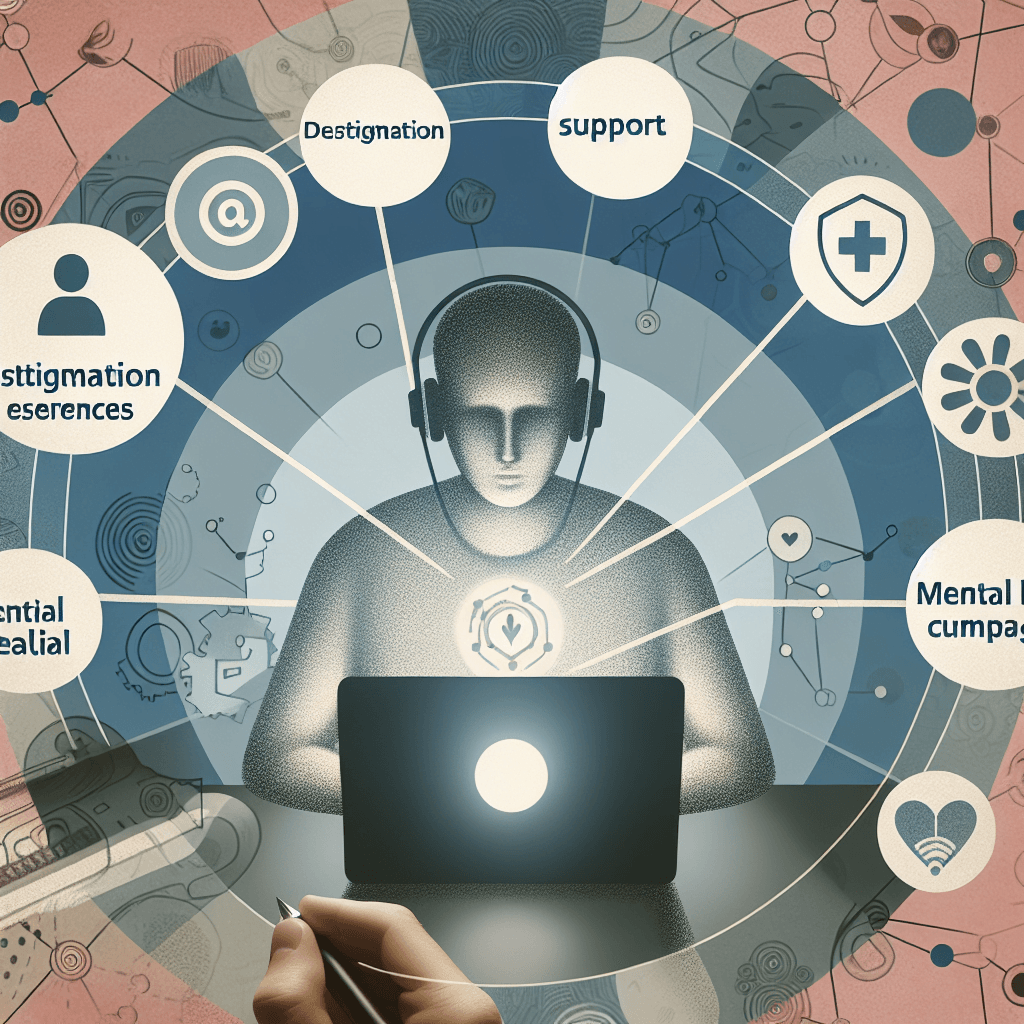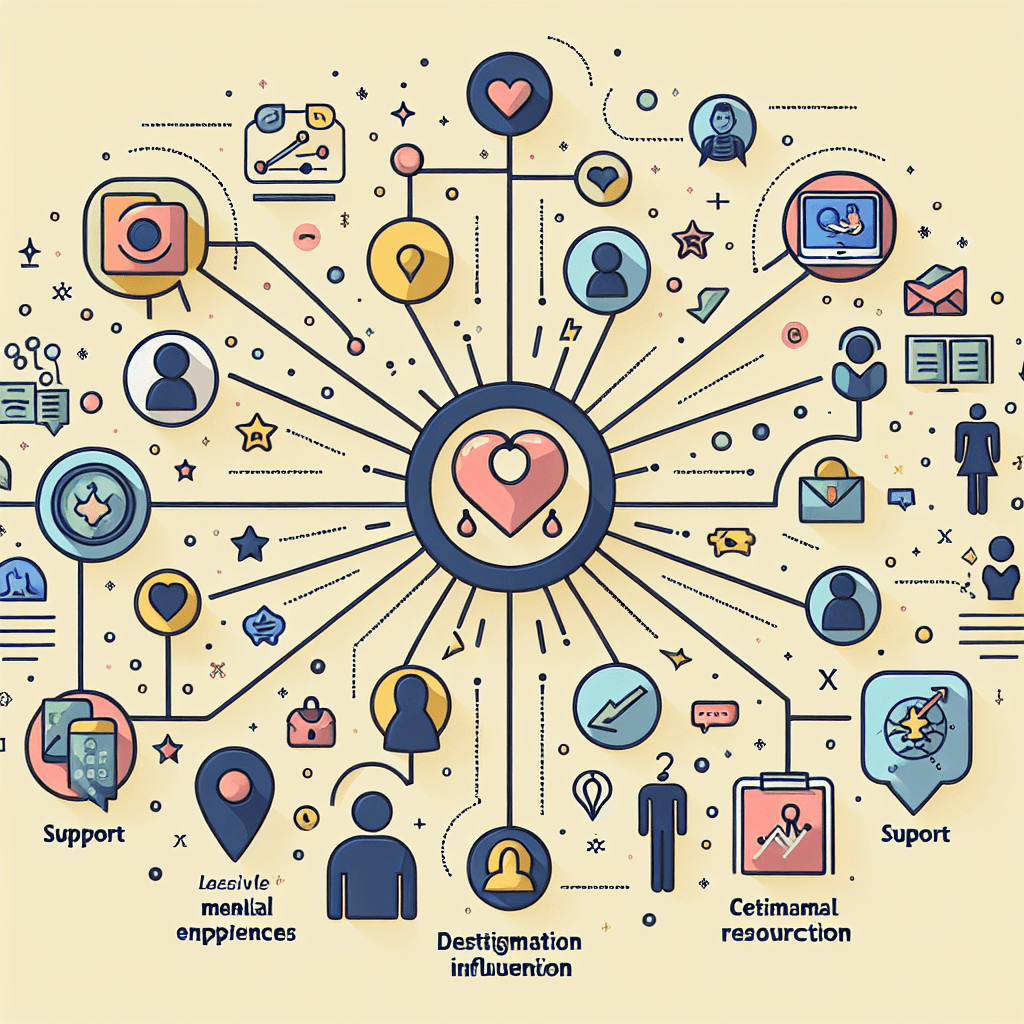Social media has become increasingly influential in our lives, and its impact extends beyond just entertainment and social connection. In recent years, it has emerged as a powerful tool in raising awareness about mental health. With its broad reach and pervasive presence, social media has the potential to shape public opinion, challenge stigmas, and provide valuable resources for those in need. This article explores the role of social media in promoting mental health awareness and discusses the various ways in which it is being utilized to support individuals and communities grappling with mental health issues.
Table of Contents
Understanding Mental Health Awareness
Definition of mental health awareness
Mental health awareness refers to the conscious recognition and understanding of mental health issues, such as disorders, illnesses, and challenges, that affect individuals. It involves having knowledge about the various aspects of mental health, including the signs and symptoms of different conditions, available resources and support systems, and strategies for prevention and early intervention. Mental health awareness encompasses recognizing the importance of mental well-being and acknowledging the impact that mental health has on individuals’ overall quality of life.
Importance of mental health awareness
Mental health awareness is crucial for multiple reasons. Firstly, it helps to eliminate the stigma surrounding mental health by promoting acceptance, empathy, and understanding. When people are educated about mental health, they are more likely to approach discussions in a compassionate and supportive manner, fostering an environment where individuals feel comfortable seeking help. Additionally, mental health awareness increases the likelihood of early intervention, preventing conditions from worsening and reducing the long-term impact on individuals’ lives. Moreover, by promoting mental health awareness, society can allocate resources, both financial and emotional, to support those affected by mental health challenges and improve the overall well-being of individuals, families, and communities.
The Rise of Social Media
Introduction to social media
Social media refers to online platforms and websites that allow users to create and share content, interact with others, and participate in virtual communities. Social media has transformed the way individuals communicate, gather information, and engage with various aspects of their lives. It provides a platform for people to connect and stay connected, sharing personal experiences, opinions, and interests instantaneously with a wide audience.
Statistics on social media usage
the rise of social media has been nothing short of remarkable. As of 2021, there are approximately 4.2 billion active social media users worldwide. This number represents more than half of the global population. The average daily time spent on social media platforms is around 2 hours and 25 minutes per day. With such extensive usage, social media has become an integral part of many people’s lives, influencing their behavior, perceptions, and even mental health.

Social Media Platforms and Mental Health
Influence of social media on mental health
Social media can significantly impact an individual’s mental health. The constant exposure to carefully curated highlight reels of others’ lives can create feelings of inadequacy, leading to negative self-comparisons and decreased self-esteem. The pressure to maintain an idealized online presence can be mentally draining and contribute to anxiety and depression. Moreover, the constant influx of information and notifications can lead to information overload, causing stress and feelings of being overwhelmed.
Positive effects of social media on mental health awareness
In contrast to its negative impact, social media has played a pivotal role in raising mental health awareness. It has provided a platform for individuals to share their personal mental health experiences, fostering a sense of solidarity and reducing feelings of isolation. By creating virtual communities centered around mental health, social media has given individuals a space where they can find support, share resources, and exchange coping strategies. Furthermore, social media has enabled activists, mental health professionals, and organizations to spread important information, resources, and campaigns to a vast audience instantly.
Negative Effects of Social Media on Mental Health
Comparison and envy on social media
One of the significant negative effects of social media on mental health is the constant exposure to idealized portrayals of others’ lives. When individuals compare their own lives to the carefully curated highlight reels on social media, it can lead to feelings of inadequacy, low self-esteem, and a distorted perception of reality. This phenomenon has been linked to increased rates of depression and anxiety.
Cyberbullying and its impact
Social media platforms have unfortunately become breeding grounds for cyberbullying, posing a severe threat to mental health. Cyberbullying involves the use of technology to harass, intimidate, or humiliate individuals. The anonymity and wide reach of social media make it easier for cyberbullying to occur, often resulting in significant emotional distress for the victims. The constant exposure to negative comments, hate speech, and online harassment can lead to anxiety, depression, and even suicidal thoughts.
Sleep disturbances and addiction
The excessive use of social media, particularly before bedtime, can interfere with individuals’ sleep patterns and quality of sleep. The blue light emitted by screens can disrupt the production of melatonin, a hormone that regulates sleep. Furthermore, individuals may become addicted to social media, constantly seeking validation, attention, or distractions from their real-life problems. This addiction can lead to social and occupational impairment, exacerbating mental health issues such as anxiety and depression.

How Social Media Can Support Mental Health
Online mental health communities and support groups
Social media has facilitated the creation of online mental health communities and support groups, allowing individuals to connect with others who share similar experiences and challenges. These communities provide a safe and supportive space where people can seek advice, share their stories, and find comfort in knowing that they are not alone. They have become invaluable resources for individuals who may not have access to in-person support or prefer the anonymity that online platforms provide.
Accessibility to resources and information
Social media has made mental health resources and information more accessible than ever before. Through platforms such as Instagram, Facebook, and Twitter, individuals can follow reputable mental health organizations, therapists, and advocates who regularly share articles, tips, and resources. These platforms also enable users to engage in discussions, ask questions, and seek guidance from professionals or individuals with lived experiences. This increased accessibility to information empowers individuals to make informed decisions about their mental health and seek appropriate support when needed.
Mindfulness and well-being apps
Social media has also contributed to the development and popularity of mindfulness and well-being apps. These apps provide users with tools and techniques to manage stress, improve sleep, practice self-care, and enhance overall well-being. Through social media platforms, individuals can discover and engage with various apps, connecting with a global community of users who are seeking to improve their mental health. Social media has allowed these apps to reach a broader audience and promote the importance of self-care and mental well-being.
The Role of Influencers and Celebrities on Social Media
Celebrities sharing their mental health journeys
Celebrities, with their vast reach and influence, have started using social media platforms to openly discuss their mental health journeys. By sharing their personal experiences with mental health challenges, celebrities have significantly contributed to reducing the stigma surrounding mental health. Their openness and vulnerability serve as powerful reminders that mental health issues can affect anyone, regardless of status or success. Through these honest and relatable stories, celebrities have inspired countless individuals to seek help, prioritize their mental well-being, and feel less alone in their struggles.
Influencers promoting positive mental health practices
Influencers, individuals who have amassed a significant following on social media, have also played a vital role in promoting positive mental health practices. Many influencers use their platforms to advocate for self-love, self-acceptance, and the importance of mental well-being. By sharing their own self-care routines, positive affirmations, and mental health tips, they encourage their followers to prioritize their mental health and adopt healthy coping mechanisms. Influencers have the ability to reach a broad and diverse audience, making their messages about mental health accessible to many individuals who may not have otherwise sought support or information.

Campaigns and Movements on Social Media
Hashtags and challenges promoting mental health awareness
Social media has witnessed the rise of numerous hashtags and challenges aimed at promoting mental health awareness. These initiatives serve as digital rallying cries, encouraging individuals to come together, share their stories, and advocate for change. Hashtags such as #endthestigma, #mentalhealthmatters, and #selfcare have gained significant traction, amplifying the message of mental health awareness to a wide audience. Challenges like the ice bucket challenge and the push-up challenge, when adapted to focus on mental health, have also garnered attention and encouraged individuals to engage in conversations surrounding mental health.
Online fundraisers and donation campaigns
Social media platforms have become powerful tools for fundraising and donation campaigns dedicated to mental health causes. Through websites like GoFundMe and crowdfunding platforms, individuals and organizations can create campaigns to rally support and raise funds for mental health research, treatment centers, and support organizations. The viral nature of social media allows these campaigns to reach a broader audience and garner greater involvement. These online fundraisers not only help finance important initiatives but also contribute to raising awareness about the significance of mental health and the need for continued support.
Online Therapy and Counseling
Advantages of online therapy
The availability of online therapy and counseling has revolutionized mental health treatment services. Online therapy offers several advantages, including increased accessibility, convenience, and affordability. It removes geographical barriers, allowing individuals to access therapy regardless of their physical location. Online therapy sessions can be scheduled at flexible times, accommodating individuals’ busy schedules. Additionally, online therapy often comes at a lower cost compared to traditional in-person therapy, making it a more viable option for individuals who may have limited financial resources.
Accessible mental health treatment services
social media has played a significant role in making mental health treatment services more accessible to individuals worldwide. Through social media platforms, therapists and counselors can showcase their services, provide information about their areas of expertise, and connect with potential clients. This increased visibility has resulted in individuals who may have previously faced barriers, such as stigma or lack of information, being able to find and access appropriate mental health care. Social media has effectively bridged the gap between mental health professionals and those seeking support, fostering a sense of community and encouraging individuals to prioritize their mental well-being.

Professional Organizations and Mental Health Advocacy
The role of professional organizations in mental health advocacy
Professional organizations, such as the American Psychological Association (APA) and the National Alliance on Mental Illness (NAMI), have been instrumental in advocating for mental health awareness and support. These organizations utilize social media platforms to disseminate information, share research findings, and promote evidence-based practices. They also collaborate with policymakers and engage in public campaigns to raise awareness about mental health issues. Through social media, professional organizations can reach a wide audience and educate individuals about the importance of mental health, reducing stigma, and available resources.
Social media as a platform for raising awareness
Social media platforms offer a unique opportunity for mental health advocacy. They serve as a digital megaphone, allowing organizations to amplify their messages and campaigns to a vast audience. Professional organizations leverage the power of social media to engage with individuals on a personal level, sharing relatable stories, and offering practical advice. By utilizing multimedia formats, such as videos and infographics, they can convey complex information in an easily digestible manner. Social media has become an essential tool for professional organizations to promote mental health awareness, encourage discussion, and mobilize support for mental health initiatives.
Future Directions: Improving Mental Health Awareness on Social Media
Addressing the negative impact of social media on mental health
Moving forward, it is crucial to address the negative impact that social media can have on mental health. Social media platforms must take responsibility for creating environments that prioritize user well-being. This can be achieved through implementing algorithms that filter harmful and triggering content, providing accessible reporting systems for cyberbullying, and promoting mental health support resources within the platform. Additionally, individuals can practice responsible social media use by limiting their screen time, engaging in self-care activities offline, and actively curating their online experience to include positive and uplifting content.
Developing guidelines and regulations for responsible social media use
To ensure the responsible use of social media, it is important to develop guidelines and regulations that safeguard the mental well-being of users. These guidelines can outline ethical practices for content creators, influencers, and celebrities, emphasizing the importance of authenticity, transparency, and promoting positive mental health messages. Furthermore, regulations can be put in place to address cyberbullying, hate speech, and the spread of misinformation on social media platforms. By establishing clear expectations and consequences, social media can become a safer and healthier space for individuals to connect, share, and engage in discussions about mental health.
In conclusion, social media has undeniably played a transformative role in mental health awareness. While it has its negative effects, such as comparison, cyberbullying, and sleep disturbances, social media has also facilitated the creation of online communities, provided accessibility to mental health resources, and empowered individuals to seek support. Influencers and celebrities have used their platforms to destigmatize mental health and promote positive well-being practices. Campaigns and movements on social media have rallied support and raised funds for mental health causes. Finally, social media has made mental health treatment services more accessible through online therapy and counseling. As we look to the future, it is crucial to address the negative impact of social media, develop guidelines for responsible use, and continue leveraging the power of these platforms to improve mental health awareness worldwide.

Organizing A Neighborhood Safety Committee For Disaster Preparedness

